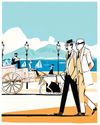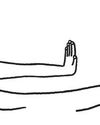
The opposition of the raw and the cooked, to borrow from the title of Claude Lévi-Strauss’s most cited though not best-read book, seems basic to our ideas of nature and culture. A raw prawn is part of the sea; broiled, it becomes part of our art. But for Lévi-Strauss the real work was done by the third leg of his “culinary triangle”: the rotting. Spoilage, after all, is a natural tendency of food and the most urgent reason we transform nature into culture—we’re desperately trying to keep what we’re about to eat from going bad.
The line between the raw and the cooked is, to be sure, nebulous; a plate of sushi is both raw and cooked, “made,” in the cultural sense, by a knife and seaweed. Sushi is the dream of pure sensation, but herring is the normal state of life. The more consequential point is that cooked meat decays more slowly than raw; pickling and curing postpone the unpalatable end even longer. We save the world from rotting by rolling it in salt, smoking it in maple fires, preserving it in brine. Nature is always going bad, and the most immediate form of “good” that humans know is keeping that from happening. Sisyphus’ famous boulder, rolled uphill and crashing down again, is better represented in our daily lives by the nova we eat on Sunday morning’s bagel—salmon saved from spoiling by smoke and salt—with the knowledge that lox, too, has a sell-by date. Its own bagel-shaped boulder ultimately rolls back down.
Denne historien er fra July 31, 2023-utgaven av The New Yorker.
Start din 7-dagers gratis prøveperiode på Magzter GOLD for å få tilgang til tusenvis av utvalgte premiumhistorier og 9000+ magasiner og aviser.
Allerede abonnent ? Logg på
Denne historien er fra July 31, 2023-utgaven av The New Yorker.
Start din 7-dagers gratis prøveperiode på Magzter GOLD for å få tilgang til tusenvis av utvalgte premiumhistorier og 9000+ magasiner og aviser.
Allerede abonnent? Logg på

BADDIE ISSUES
\"Wicked\" and \"Gladiator II.\"

LET'S MAKE A DEAL
\"Death Becomes Her\" and \"Burnout Paradise.\"

ANTI HEROES
\"The Franchise,\" on HBO.

FELLOW-TRAVELLERS
The surprisingly sunny origins of the Frankfurt School.

NOW YOU SEE ME
John Singer Sargent's strange, slippery portraits of an art dealer's family.

PARIS FRIEND - SHUANG XUETAO
Xiaoguo had a terror of thirst, so he kept a glass of water on the table beside his hospital bed. As soon as it was empty, he asked me to refill it. I wanted to warn him that this was unhealthy - guzzling water all night long puts pressure on the kidneys, and pissing that much couldn't be good for his injury. He was tall, though, so I decided his insides could probably cope.

WILD SIDE
Is Lake Tahoe's bear boom getting out of hand?

GETTING A GRIP
Robots learn to use their hands.

WITHHOLDING SEX FROM MY WIFE
In the wake of [the] election, progressive women, who are outraged over Donald Trump's victory at the ballot box, have taken to social media with public, vengeful vows of chastity. - The Free Press.

DEADLINE EXTENSION
Old age, reborn.